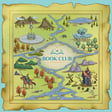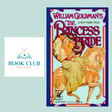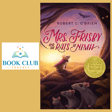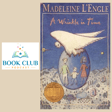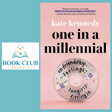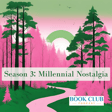Become a Creator today!Start creating today - Share your story with the world!
Start for free
00:00:00
00:00:01

The Giver by Lois Lowry Book Club
Guests My and Jenni join Carly to talk about what it means to make choices for yourself and if experiencing pain and suffering is a good trade-off for being able to make choices for yourself. They also talk about the expectations put on Millennials in school to save the rainforests and the whales and to fix the hole in the Ozone. Jonas makes a choice that will change his whole society, have Millennials succeeded in changing our whole society?
Subscribe to our email newsletter on Substack: https://bookclubpod.com/ and be sure to follow us on Twitter and Threads!
Transcript
Introduction and Spoiler Alert
00:00:00
Speaker
Hello listeners, we will be spoiling The Giver by Lois Lowry. Also, our discussion may touch on the topic of child deaths, so please take care.
Jonas's Perception of the River
00:00:13
Speaker
Now through the memories he had seen oceans and mountain lakes and streams that gurgled through woods and now he saw the familiar wide river beside the path differently. He saw all of the light and color and history it contained and carried in its low moving water and he knew that there was an elsewhere from which it came and an elsewhere to which it was going.
Technical Difficulties and Host Introductions
00:00:35
Speaker
Welcome to the Book Club Podcast. I'm Carly and I'm an elder millennial. Today, my guests are Jenny and me. We had some technical difficulties when we first recorded this portion of the podcast, so this will sound a little different. Here is Jenny sharing her history with the
Jenny's First Experience with 'The Giver'
00:00:51
Speaker
giver.
00:00:51
Speaker
Hi, my name is Jenny and I'm an elder millennial. I first read The Giver in seventh grade just a few years after the publication and having just picked it up off a shelf without any introduction. It was the first book I read twice and I was captivated by this strange society, Jonas's experience as receiver and the powerful effect that his ability to see color and the memories he has given have on his mind. And here is me sharing her history
Revisiting 'The Giver' and Its Impact
00:01:21
Speaker
with The Giver. Hello, Carly and Jenny. I'm glad to be here. I'm me, Wian, and I'm an early millennial.
00:01:27
Speaker
The Giver is a book that I wrote revisit every few years just because I find the story to be so powerful and well-written, even though it is characterized as a Jew or YA fiction novel. And I think The Giver is definitely emblematic of the adage that you shouldn't judge a book by its cover or genre, because it wasn't something that I would certainly gravitate it towards. um were it not for being assigned. ah And the ah ambiguous ending of this novel continues to haunt me.
00:02:01
Speaker
I cannot remember exactly when I read it, but I know for sure that I didn't read it when I was in middle school or high school, which I really regret because it would have been cool to, like, grow up alongside the book. But now I get to grow old alongside it, which is also cool. Yes, I can't remember when I first read it either. I think I was in my 20s and I remember just wanting to know what happened to Jonathan Gabriel after this. So a few years ago, I reread the book and I learned that there were sequels. So I reread them all and with ease the word haunted me. And I am also haunted by the story and Lowry's infusion of magic in this story where I often don't expect it. though
00:02:53
Speaker
Let's get to the summary.
Jonas's World and Role
00:02:55
Speaker
The story follows Jonas, a 12-year-old boy living in a very structured community. The lives of each person are managed according to longstanding traditions. Babies are kept in a nurturing center until the December after their birth, at which point they are assigned to a family unit. Adults are assigned spouses in homes and may request to receive a baby when they are ready. Each family receives one boy and one girl to raise. Each day is structured with rituals of sharing dreams at breakfast and sharing feelings at dinner.
00:03:24
Speaker
When the children are 12, they are assigned to train for their vocation, which they will have until retirement. Retired adults are cared for in a retirement home. When an adult has reached a certain age, they are released. People who break the rule through times are also released. At the annual ceremony recognizing children moving into the next year of development and responsibilities, Jonas' peers are assigned to their vocation, but Jonas is skipped. At the end of the ceremony, he is given the role called receiver of memories. He is told that this is a great honor, but he doesn't know anything about it. The community has one receiver of memories, a person with a responsibility for receiving all the memories of the world from before the community's founding. The previous receiver of memories becomes the giver to magically transmit the memories to Jonas.
00:04:22
Speaker
Jonas's father works as a nurturer. He gets special permission to bring a baby home, and named Gabriel, who was not able to sleep through the night. Jonas volunteers to have Gabriel sleep in his room, and he shares his memories with Gabriel to help him sleep. youruts received memories yeah no cold war family and love he began fitel but prominently by gaining the a abilityity color
00:04:54
Speaker
jonath learns that the rest of the community protected from the memory prevent them from making the wrong choice He also learns that release is really an execution when he watches his father release a twin because the community does not accept two children looking identical. Jonas believes it is wrong to keep the memories and feeling from the community. He and the giver decide on a plan to let Jonas run away because if you leave, all the memories come back to the The day before the escape,
00:05:29
Speaker
Jonas learns that Gabriel is going to be released because he can't sleep through the night. He decides to take Gabriel with him. They bike for several days. They find a snowy place and nearly free when Jonas finds the sled and slides down a hill towards the house, just like in the first memory that
The Value of Choice and Experience
00:05:46
Speaker
the giver shared with him. Great. Thank you, Jenny and Carly. So I guess a question that struck me, and I suppose this is what the opening question is today, is what is choice? What does it mean to choose? And is knowing, is experience really actually worth it? That question comes up between Jonas and the giver, chapter 13. Jonas is talking about like how he can see color and he wants everyone to be able to see these things. He wants to be able to choose to wear a different colored shirt or to, you know,
00:06:26
Speaker
It starts with a very seemingly like frivolous thing of like just being able to see color and to choose the colors that you wear. But then it turns into a conversation about how it's and it would be unsafe if people could choose for themselves. it would be like What if someone could choose their own spouse and they chose wrong? and Jonas, I don't think he's at a point where he can comprehend that question beyond, oh, no, that'd be terrible. He's very young, obviously. He's never lived in a society where people had choices. So it doesn't go much farther than that. But I think that's a really funny question, especially as a young person, as an at ah as an adolescent.
00:07:09
Speaker
It feels like your decisions are forever, but I think as you get older, you learn, oh, I made that decision, went down that path for a while and it didn't work out. And so I switched and it was fine. Like, I think a lot, we can have experiences and then they're valuable in a way for a time period and then you move on. But it's interesting that, that. The question comes up, but I don't really feel satisfied with the answer we get in this book. and I would try to remember what voices they do get to make. You know, occasionally the community will have a day with no obligation where people don't have to work or go choose to go play. Oh, and they have the opportunity to choose where they volunteer.
00:07:59
Speaker
and where they volunteer, help inform the people who decide on their occupation. They log all of their hours at the elder center, then they're probably going to be taking care of the elders that they ate. So there is some limited choice. But I don't know if they see that as a choice that affects the rest of their lives. I suppose i suppose John has done, because he realizes that he doesn't have a strong inclination to any one place. I can't help but be struck by the fact that most, if not all, the choices, the limited choices that these characters in this community are allowed to make directly benefit the community itself.
00:08:50
Speaker
I was struck by Jenny's very great observation that the children are able to choose the volunteering positions, but that benefits the community. I think one of the very few things that doesn't really benefit the community that the kids get to choose is breaking the rule to ride a bicycle. I think that's the only thing. I can't think of any other example. E. Young started to try to take an Apple phone. is immediately caught and um kind of broadcasted community. Like there are immediate repercussions for choices that the community doesn't see as beneficial for the community. Exactly. So any choice that these citizens dare to make that
00:09:42
Speaker
even hint at selfishness is directly and immediately, like Jenny said, chastise quite quite publicly. So I guess it's really impossible to make any choices in the in this community. would Would that be crazy to say? It's impossible, right? Everything has been chosen for you right down to the clothes you wear, at what age you get to wear the clothes, how you style your hair. There's sameness. That's what it's called, I think. the receiver calls it sameness with a capital S. And it seems to work for them. And so I just can't help but think at 37 reading this versus when I was maybe in my late adolescence, early 20s, I feel like there's always sameness. And when you're a kid, sameness is
00:10:37
Speaker
not very fun, right? Because you're always being told what to do by your parents, by your teachers, by people in authority. So of course, when Jonas goes into his training with the receiver, he he seems tantalized by the possibility of choice, by the possibility of non-same-ness. But he's we have to remember, he's 12. He just turned 12. He's still a kid. The description of the same-ness is really powerful. And right now, we're looking at it from a lens of voice. But one of the things that struck me in this reading, my most recent reading, was his friend Asher, who had trouble speaking. He, in some ways, was different. It wasn't a choice, but it was treated as if his speaking was a choice. That it was something that he should be fixing, you know, when he asked for it was treats or something, but instead he got lashes.
00:11:36
Speaker
Yeah, he instead of snack, he said smack. And then after that, at some point, he stopped talking completely for months at a time. And oh, and that story was told as if it was so funny. Like, I'm reading this, I'm like, Oh, no, this poor child has been traumatized to be silent. Yeah, that was that was disturbing. So I'm sorry, I didn't mean to interrupt, but you were talking about his speech impediment. I mean, something like dyslexia maybe like was treated it as if it was his own choice to make these errors.
00:12:09
Speaker
And they did, I guess, eventually correct his, his misspeaking, but it just shows this lack of patience again for, for any thing that's different or any one that's different. And, you know, they could eliminate a lot of choices, you know, all of the girls would dress the all of the boys would dress the same way. They all do the same thing, the everyone else in their year. But there's a limit to how far they can control that. And so when you have someone that doesn't fit in, they're given some time to correct and become the same. And if not, they're eliminated. Like, to take it to the further extent of action through immunity. They're like, no, if if you can't fit in, you have to go.
00:13:00
Speaker
So the story starts with Jonas remembering a pilot flying over the community with breaking the rules. And it's announced that there's nothing to be afraid of. But of course, the pilot is being released for his or her mistake. And that's said as a very madam matter of fact, almost like funny. ah Didn't she say that the tone of voice in the announcement was kind of like, well, of course they're being released. like And then you learn later what being released means. And it's interesting that being released is such a strong consequence when most of the people don't even know what it means. So your opening question, you talked a bit about knowledge.
00:13:47
Speaker
You mentioned is knowing or is experience really worth it? these These people have no knowledge of what release means. The unknown part of that is enough of a deterrent that most people are orderly because that is the final three mistakes and you're out. And Jonas and his sister, maybe the adults do know
Sameness vs. Individuality
00:14:09
Speaker
what it means, but Jonas and you know and a sister are imagining what happens to people who are released and as if they are living in other communities. So that just occurs to me that maybe the adults do actually know what it means.
00:14:22
Speaker
that there's some point in time where they learn, or maybe only specific people learn what it means. And then Jonas, when he learns that his father is releasing children, there's a line towards the end where he hears about his parents' day and he, like, imprints their lies about their day, the way that they lie. And I thought that was harsh. Like I don't know that that's necessarily true that they're lying about what they do during the day. But Jonas feels that they're lying because of this huge reveal about release. And his mother works in the judicial system. So she has I guess she has some judgment over when people break rules who gets released and who does it. I think an answer, not the answer, but an answer to your question, Carly, about whether or not they know about release.
00:15:07
Speaker
lies in the fact that no one in the community, except for maybe Jonas and the receiver, have actual feelings i think I think Lois Lowry does it know a pretty good job of highlighting that ah through various examples. When Jonas asks, mother and father, do you love me? And he is gently rebuked and gently mocked for his imprecision of language, or when Lily claims to be a angry.
00:15:39
Speaker
Jonas privately thinks that's not true. Lily, you've never known what anger is. I've actually felt anger as transmitted through me via the receiver. I don't think that most of the community members have feelings. Feelings as we human beings know it, they have what loosely approximates to feelings, but it's not actually the feelings that we as human beings share and experience. And so do they know what release is? People like Fiona, who I think the receiver characterizes as finely trained in the art of release, or the father who releases babies. Yes, I think they are aware of what release is, but I don't think they realize the impact or the enormity
00:16:31
Speaker
of what it is to us. i kind of felt that when you were talkinging about asher being mo i that he couldn't correctly and so i would you have a lackc of empathy like there they're feeling their emotion are like and imitation oh but merchant and ah far as relief go and I'm thinking of each member of this society plays a function to help the society continue, but nothing really happens on the individual level. So a person being relieved
00:17:10
Speaker
is not serving the community. And so there's no emotional attachment to that. Well, they you know even for the elders, they they had a great life. We celebrated them. They're no longer serving the community and they're gone now.
00:17:30
Speaker
Okay. That makes so much sense that
00:17:35
Speaker
Because these people are not serving the community being released and there's no personal attachment like that really clarifies a lot about this story for me. I can't stop thinking about the color like being able to see color feels. So primal but also simple and that making that connection of seeing color or hear music because, you know, the older receiver, he didn't see color the way that Jonas did, but he could hear music. Why is that?
00:18:09
Speaker
sort of the entry point into this, can we call it self-knowledge or this awareness? That's sort of the gateway into, first of all, being capable of receiving the memories because Jonas does try to share them with Asher, and Asher's like, what are you doing? He's not able to receive. But Gabriel is able to receive, so it's not a skill that belongs to everyone. And there's some connection between that of being able to receive the memories, see color, hear music, and comprehend suffering and pain and love and family. And it seems like I'm not understanding the connection there. There's a big gap.
00:18:52
Speaker
I think with music and color and scent and sight and sound, there's an opportunity to distinguish what you want, what you like, what you prefer, what you cherish, what you reject, because you have the opportunity to choose when you do have your faculty of senses. You have the opportunity to state a preference. I really like the color red. I really dislike the color green. And that way you are able to make a choice between, oh, I'm going to wear this red shirt instead of this green shirt. And I think maybe that is why
00:19:33
Speaker
The faculty of Senses, a finely honed faculty of of Senses helps you make choices that are very personal to you. And I guess there's nothing really more personal than love or than hatred with warfare, I guess. And without the faculties of Senses, you just have sameness. You just have this community of ah flatness. I think even before with Kuwait, it's how you interact with your world. Any form of connection is going to come through your senses, and I think that even comes before the opportunity to choose between red and green. I think it's easy to pull sight and sound from the world, but I think it implies that the other senses are gone too. You never really hear them describe that they enjoy the taste of a meal, and I'm not really sure if there's any examples of touch in the book.
00:20:29
Speaker
before the giver gives Jonas his birth memory. So without them, they've eliminated feeling. You can't sense your world. You can't feel anything. Then yes, I mean, choice isn't even a possibility. I guess what the the question that all of this brings me around to is why is this community working so hard to preserve
Security vs. Freedom
00:20:52
Speaker
sameness? Yeah, so yeah getting back to the opening question, is it worth it? like Is it worth abandoning or rejecting knowledge and choice for this very secure, very non-stressful life? Jonas and the giver say no.
00:21:13
Speaker
and they have the memories of a different way of living to inform them. So I think we're supposed to agree with them, but I'm not so sure. I'm really disturbed by this. I'm really disturbed because I fully agree Jonas and the giver slash receiver have an endless wealth of memories and of experience and of feelings, a lot of which are beautiful. There's an example of of wonderful feeling was um like lying on a hammock by the beach or the gift of music. But we also are confronted with a lot of distressing memories. The giver transmits war, thirst, hunger, poverty, pain,
00:22:02
Speaker
A leg being broken? Death? A child being taken away from their parents? These are terrible, terrible tragedies. that both Jonas and the Gibber slash receiver contain. And I just find it so curious and so crazy that they do think that transmitting this to the community, transmitting the gift, I guess, of experience and of knowing that they do think it's worth it when we see so many examples in this book of how it isn't.
00:22:36
Speaker
the The Giver is has aged so much in his years serving in this role because he has to hold on to such intense and unspeakably painful memories. But yeah, I agree. I feel like Lois Lowry is kind of nudging us as readers to want to go and follow Jonas and the Giver. And at 37, I don't know if I feel comfortable with the Maybe when I was 12 or when I was 18 or 19 reading this, like, sure, that's great. But my goodness, this is terrible stuff that they're experiencing. I think their memories of death inform their attitude towards relief, even though the elders or the babies who are being released are being released in a remarkably humane way. That's very peaceful. From what you can tell, there's little pain associated with it.
00:23:27
Speaker
But, you know, the soldier dying or the boy dying on the battlefield informs their decision that, oh, death is bad. That is a great point, Jenny. I did not think of that, but yes. And I feel like the givers shared, or at least Lois Lowry described, more negative memories than positive ones. Yeah. Like, I think, I remember correctly, there's an example of an elephant being hurt. Right. yeah Before that, Jonas didn't know that elephants were real animals. So again, like that memory has so many dimensions to it. The wow, look at the magnificent creature, the color of its blood. It's all about expression. And again, the fact that he's swell really adds to it. When you're an adolescent or becoming an adolescent,
00:24:19
Speaker
the colors and the world, everything is so much more vivid. The power of those sensations has to be really motivating for him. But with AIDS, all of those colors and deaths do feel differently. If I were being asked to experience war or experience sameness, I would say that. It is a lot to give up. And I feel like maybe that's the decision that the giver and Jonas are making for unity. They don't realize anymore. They have lost the authority to do that. And maybe each person who should be able to share what they experience. Well, I wonder how much of this is because the responsibility of holding these memories has been imposed on one person and that even extremely painful experiences are much better when you share them, even if you're just talking about them and getting sympathy from other people.
00:25:19
Speaker
that the real problem with this community is not that they have preferred sameness. It's that they're putting this responsibility of bearing the weight of their history on one person and that it's a responsibility for everyone in the community. It should be everyone in the community bearing the weight for it. And maybe that even gets back to the to choice that the the people alive in the story that we read did not choose this lifestyle. Their ancestors did and made the choice. So if Jonas leaves and all the memories are shared among all the people in the community, then they can choose to continue their sameness lifestyle with the full knowledge of why they chose it.
00:26:03
Speaker
I think that's a really great point. I guess I'm going to push back a little bit very gently about this, because with choice, there involves emotions. And it's hard to make informed decisions, I believe, when emotions are involved. When you see color, you experience joy and pleasure. When you see a distressing scene, you experience pain and grief. And these are very powerful emotions. And even the not so powerful emotion like annoyance or frustration or contentment, they are nevertheless things that are very personal. And I guess these are emotions that inform choice. And sometimes when you make decisions and motivated by by emotions, it leads to not so great things, I think. So my point is.
00:26:52
Speaker
If given that the choice for these citizens to remain in sameness or to follow Jonas and the receiver slash the giver, I wonder if it's ever really possible to truly make an informed choice if if there are emotions involved, if the giver does transmit these memories and these feelings to the citizens to have them make a choice, would that be a fair choice given that these emotions and these very charged memories are being transmitted to them?
00:27:29
Speaker
Does that question make sense? I just feel like it's very hard to make sound decisions when when you have emotions guiding you. And I say this because I feel like Jonas is being motivated by emotion. He's not really motivated by intellect. ah Really quickly, I just feel like the sameness, this society of sameness is strictly functionary. There is no emotion and it works really well because there are no feelings or emotions. It's dystopian to us, but it might be bliss to others. It all yeah depends on your goal.
Millennial Reflections on Change
00:28:02
Speaker
What's the goal? Is the goal to run a very mutually functioning society? Or is the goal to help the individuals of your society lead rich and fulfilling an interesting life? The giver stays behind and they Jonas argues with him and begs him to to come
00:28:21
Speaker
with Jonas. he's Jonas is like, I need you. I have to go out into the world that I need you to come with me. And they the giver says, no, the community will need me. They will be very upset when they receive your memories and they will need me to help them get through it. And so I think the giver understands that these emotions will be a lot to handle. But they also have the ritual of sharing emotions every night at dinner. Like they have this practice which I think is really strange because why have a practice about sharing your feelings? They don't have feelings, right? So that it feels like an artifact that stuck around as a ritual that they didn't really need, but it feels like they've been preparing to have to deal with these difficult emotions because they have this practice of sharing it completely. It's unthinkable to not share. And Jonas being told that he doesn't have to share, honestly,
00:29:19
Speaker
is a big shift for him when he starts training. If you can't make sound decisions because of emotions, then no one could ever make sound decisions, right? So maybe we need to change our definition of what a sound decision is. It can't be completely rational. And is that necessarily bad? It's not rational for Jonas to ride a bike in the snow with a two-year-old. He's 13. To try and find somewhere else to go. It's not rational, but he can't not do it. Yeah. But me, you asked the question, is it because he's naive? Is it a good-hearted characteristic of Jonas to do this, or is it because he's naive? I wonder if you could expand on that.
00:30:03
Speaker
We just have to remember, again, that this fellow is 12. And when you're when you're young, you're easily swayed. I know I certainly was ah by my feelings, by emotions, by very big feelings and very big emotions. And so I guess reading it at 37, I think this is a great story for young people, but is it a great story for me at 37 when I don't want a lot of chaos and strife and struggle in my own life. And I don't want to feel uncomfortable or unhappy or or distressed. And it's just so difficult because the the good side of me, the good-hearted side of me thinks that Jonas is is doing
00:30:47
Speaker
the right thing in all caps, like though he's doing the the right thing. He's a good person. But the, I guess the cynic in me, the the adult in me thinks, my goodness.
00:31:02
Speaker
You're motivated by by feelings. Yes. I think Jenny or Carly mentioned it's not a very rational decision to escape your community on a bike with only two weeks worth of food rations with your two year old baby brother strapped in in the backseat. That's not a very rational thing. But Carly you do ask like It's not rational, but was it necessary? And I feel like in his heart of hearts, Jonas absolutely thinks it was it is necessary. Do I think it's necessary? I i don't know. I just i just don't know. it it it has It's hard to say because it's hard to speak from my vantage point as somebody approaching 40.
00:31:46
Speaker
I wish I could have been asked this maybe when I was 15 or 16. I think my answer would be different then. But now it's crazy to be honest. It's and it's irresponsible. I think that segues into our genre themes. But um before we do that, I just want to give if there's anything else that you all want to say about the story before we move into genre theme. But I think that kind of leads into what I want to say about our genre. I just have to say that it could be that Jonah, by sharing memories with Gabriel, built a connection that wouldn't allow him to make a decision for Gabriel Bevery. That through sharing those memories and that shared experience, it was no longer just
00:32:28
Speaker
Oh, I'm going to stay here safe and the two-year-old is going to be released and that's fine. There's something about memories that really connect us. That's a good point. That's a really good point. Just talking about personal experience, I'm 41. The Giver, I didn't read it as a child, but it is very similar to a lot of the books that I read of pre-teens and teens being left alone to fend for themselves, right? that seems to be a very ah That was a very popular ah topic in the books. I read, like, Hatchet, or Julie of the Wolves, or Island of the Blue Dolphins. like Just so many books that that were popular were about these young,
00:33:05
Speaker
kids taking on the responsibility of being independent, fending for themselves. And I wonder how much that influenced not just my worldview, but like the millennial worldview of yes, this is what you do. You go on, you take on the world. It seems to be a trend in the books that we're reading this season that these young characters take on this independence and they end up making decisions that shift the way their whole society works. It has these huge repercussions. And so we're millennials told you're going to go out and change the world. Right. I feel like I was told that. Yes. And now that we're. adults, did we change the world? Do we feel a pressure of failure of weariness? like fa like We've been banging our heads against the wall to make big societal changes. I think it's hard even if you do make big societal changes to look back and recognize that. I think it's hard to to recognize what you have accomplished and takes effort
00:34:07
Speaker
to really think through like, oh, yes, this has changed, but you grow so accustomed to the change that you have to really make the effort to see what has changed. But anyway, I can't rationally connect the dots, but it feels like this is correct. No, I fully agree, Carly. Jonas is a great example. You are going to change the world. You're going to change this community. that can't even decide whether or not the age threshold for folks who can ride a bicycle can be. Like you have to like let go back to the committee for a discussion or something. There's a big joke about that, that you might as well not do it because the committee will never reach a decision. So Jonas, thinking that he is going to be so powerful and so good hearted and he has such great intentions to change the community, I think really is a very
00:35:00
Speaker
millennial-y genre in YA fiction. And do I feel like I feel? Yes, I do. I don't think I've changed the world. Now, was it a great effort? Was there a great effort on on this genre's part to try and motivate me? I think so. I think it was ah done with good intentions. But it's difficult. It's difficult to change anything. Yeah. I feel like if I think back, the elementary school, especially elementary, it was the time that we were going to, you were going to save the whales. We were going to save the rainforest. We were going to close the bowl in the original layer.
00:35:45
Speaker
So it wasn't the fiction we were reading, there was also this kind of societal move to make the world a better place. For some things I think we've done well, but I would lie if I'd say there isn't a day that goes by that I don't see my own role in continuing the status quo and not same, same thing that if I were the hero of a young adult novel, I would set up a game. And it's easy to feel powerless, I think, when you're up a again with a large societal machine. The way we live right now has so much momentum behind it. It's like you almost wait for something big and exciting to happen so that there's enough of a shakeout to fully create shame.
00:36:32
Speaker
um yeah i dont had the opportunity to really ancient you and I don't know how much I feel like on a daily basis I can do that. or could have done that over the last 20 years. Yeah, so were we infused with this belief that it is possible, it is possible for one person to make a change, right? I mean, I was a political activist. I loved that because I was spending time with it with a couple I knew who had done a lot of great activism work. They had been working for 20 years and made very small changes. Now, I fully admire them and admire the work that they've done and the influence they've had on their community.
00:37:12
Speaker
But to have worked for 20 years and maybe change a few words in a law, like that felt so disheartening. And I wonder if this idea has set us up for failure, that we had such high expectations. This is true in the one in a millennial discussion. We talked a little bit about that millennials were raised for a world that didn't exist by the time they grew up. and so being raised with these expectations that like, yes, one person can. I love the examples you brought up, Jenny. Close the ozone, save the whales, save the rainforest. When actually, I think about those issues now, and we like I could not definitively say, like you could find data to say that the hole in the ozone is fixed, or it actually doesn't have the impact we thought it did, or you know any number of things. or like
00:38:04
Speaker
The whales were thriving during COVID shutdown. There's data, but it's so unclear. I couldn't tell you one way or the other because there's so much information telling me that either could be true, that we failed or we succeeded or something in between, or there's no way to know. um So they' it's dissatisfying in that way. So I wouldn't say I feel like a failure. I feel like there's so many ways to understand the state of the world, the state of our society, and the way our actions affect those things that I couldn't give you an answer either way. And while we're on the topic of childhood and our millennial youth, was anybody struck by
00:38:48
Speaker
the senior elder saying to each child during the ceremony of 12, thank you for your childhood. It's interesting that the community is so, there's so much taboo against bringing attention to people's differences. And in that ceremony, the elder gives a personalized description of their childhoods. Because earlier I was thinking, oh, they don't have a value on like the individual person But that's not quite true because they do, they all like last with the memories of these particular children experiences growing up. And it's something that's shared. I think that gets back to what which Jenny said of like bringing value to the community. That the whole community raised these children essentially and was part of their lives. Does that end when they turn 12? That they're no longer common among everyone? That doesn't make sense to me either. I don't know what that means. Yeah. Why is it childhood? Why thank you for your childhood? Yeah, it seems like such a strange thing to say. Thank you for your childhood. And in fact, it almost sounds ominous, but maybe that's just my cynicism. But thank you for your childhood. It's like saying thank you for your patience. Thank you for your kindness. it Thank you for your childhood. It may have been a little too hard on the society if I maybe give them a little bit of grace.
00:40:19
Speaker
and think that, you know, children do play a really unique role in society. They do make us laugh. They help us relearn things and pay attention to things that we've forgotten to You know, to watch a toddler play with an older person yeah is really amazing. It's like the older person remembers their youth. And so everything like from thank you for your childhood to the feeling shared every morning and evening. ah The cynical part for me says that they're only doing that to keep track of the community and know when you know puberty is starting or make sure there's not an outlier. but
00:41:03
Speaker
problem because the hitter comes on all the time. So that's the cynical heart of me. But if I give them positive intent, they haven't completely lost touch with their ability to identify individuals or to have feelings. They've got to desert themselves from things that could be painful. So the next genre theme I want to talk about is connection, how characters in these books seek and find genuine connection. Jenny, you brought up the connection between Jonas and Gabriel maybe being a result of sharing memories, which I love. Is there anything more to say about that? I think we talked a lot about that already. but
00:41:48
Speaker
I think it's really important and I think that the connection that the giver and Jonas has is like the other really powerful connection in the novel. And Jonas realizes that the connection he felt with his family members and his friends were hollow after truly exchanging these memories with someone else. right If I remember correctly, at the very end of the novel, when Jonas is almost freezing to death, he found joy in
00:42:28
Speaker
his memories of his sister and Asher and Fiona and Riding Bight. So if it seems to come down to like, what's the value we crave on the memories and the experiences we have with her. And one of the things that truly brings that out is moments of stress and their community doesn't have moments of stress anymore. Um, they've had done, but, but yeah, it's just like how valuable is, you know, a silly situation with your younger sister when there's nothing to compare it to. Hmm. So another genre theme is the role of women and the value of feminine activities. There's very little distinction between boys and girls. You know, there's a couple of things where at one age, the girls don't wear braids anymore or something, something like that. But as far as like the way that they assign vocations, there doesn't seem to be gender.
00:43:20
Speaker
difference. What do you all think? The point of the genre themes is like, I'm looking for clues. Like, did this influence the way I viewed the world as I was growing up? Like, yeah i there were too many stories that did not value female characters or female experiences. So I'm looking for that in these books. So I want to know what you guys think. Well, I was really struck by the disdain that the mother had for for the for for the birth mothers. Lily says innocently, oh, being a birth mother sounds like it would be great. And she's sharply rebuked by her mother for
00:43:54
Speaker
this role, which encompasses what, three years of a great life, of a relaxed life with gentle movement and care and good food. And then you're relegated to hard labor for the rest of your life. And so I thought that was very strange that birth would be considered so negatively. Yeah, that the birth mothers are not valued at all, but giving birth is distinct from being a parent, right? Like there's no blood connection between the families. Yeah, the families are generated, you know, they're looking for good matches that will help.
00:44:31
Speaker
society took along without any drama because motherhood is challenging. It's rewarding at a full all kinds of emotions. So I can see why they wouldn't allow that practice to be part of ah the society. Like having a mother having a child and loving it it in well with the idea of saying there's no way that mother's plan would have let one of her children be released. Yeah. so I can see why they would get rid of motherhood in the way we think about it. I think those emotions are what really make motherhood special. And without that, yeah, being a birth mother, I'll be honest, I think that's a very blind stop. It's not really a pretty situation. So if we think about feminism and just like how it might inform our ideas, you never want to be regulated to be just a birth mother. You want to be.
00:45:28
Speaker
a mother in all of its depth and beauty. does throw a little shade on doing hard labor too. It's a really necessary part of her life. i
00:45:42
Speaker
I don't know, in some ways it's kind of nice that there's not a big difference between men and women in society. Yeah. Yeah. The birth mothers are strictly functionary. their Their one function is to birth three babies and that's it. So there there doesn't seem to be a lot of honor or prestige in the way that being a receiver is or being a judge, like Jonas' mother or a nurturer. One of the things that the society did get right, though, is yes, like Jenny mentioned, there isn't really a just distinguished difference between male or female. But there's also there's also no same sex couples. Like, there doesn't seem to be any sex at all. There's a mother and a father with a son and a daughter or a daughter and a son. Like, that's very strict. But I guess it I mean, everyone takes those pills.
00:46:33
Speaker
So I'm finding it very strange. like Why even have these family units, I guess they decided at some point that having two parents for two kids is the best for for those kids to flourish to get that level of one-on-one time and attention. Because otherwise they would just put them in a shared, like chat like each children could stay in a nurturing center and just like move along according to their stage of development. like Why put them in households with parents to begin with? but there is a special relationship between the siblings, right? like right And that decision was probably in the form by one of the receivers of the path.
00:47:13
Speaker
Yes. yeah Well, I do want to mention there is a movie adaptation, but none of us really thought it was memorable.
Final Thoughts and Recommendations
00:47:20
Speaker
So um i books and other books in this series ah will have a more interesting movie adaptation. So we will be talking about those in other episodes. um Any final thoughts on The Giver? It's a wonderful book. I think that everybody should have an opportunity to read it and experience and come away with the knowledge of what it means to make choices and what the implications of making choices are. I think this is a profound book and I i feel really lucky that I had an opportunity to read it. I would say that reading it as a youth definitely informs my perspective on what it is to have feelings and to be active in the world around you. I think the thing that made me read the book a second time was just
00:48:11
Speaker
imagining the society without color, without these interactions and without these immersions and a truly terrifying ending, umll where you you don't know what's happening next. But I think for for a young reader, it gives a lot of perspective about, you know, experiences that you have and how it gives you can look at the world. And reading it again, an adult and just thinking of, again, like all of the experience that I would not have had if it's for least the society I lived in. It's just like a really interesting experience. And John is a philosopher. He's full of questions. And it's again, the writing is so direct and it's a really quick read, but has the really powerful, it's definitely powerful. Yes, Jenny, you're absolutely right.
'The Giver's Ending and Listener Interaction
00:49:00
Speaker
Jonas is a philosopher, and Jonas was also selected for a variety of reasons, but one of which is that the elders noticed that he had the ability to see beyond. And since we're at the end of the discussion, I wanted to know the ending. What did y'all think happened? um is is Jonas seeing beyond in terms of, you know, he's so certain. I'll just read this. Downward, downward, faster and faster. This is the on the last page. Suddenly he was aware with certainty and joy that below, ahead, they were waiting for him and that they were waiting too for the baby. And just as a reminder, he's on a sled and he's sliding down this no-covered hill. And I mention this because
00:49:47
Speaker
One of the first memories that the giver imparts to him is the memory of snow and the memory of going down a sled. And then after that encounter, Jonas continue like has a dream like a recurring dream of this sled. And you'll indulge me. I just want to know what we think the ending is. And I feel like this passage might be the key. It's in chapter 12. And they're sharing their dreams. And the mother asks if you slept soundly. Jonas had slept soundly again and again as he slept. He had slid down that snow-covered hill. Always in the dream, it seemed as if there were a destination, a something. He could not grasp what that lay beyond the place where the thickness of snow brought the sled to a stop. And then at the end, we we see that he is sliding down a hill.
00:50:42
Speaker
and and he sees some sort of vision. And so is my question to the group is, what is that vision? What's happening here? Is he is he hallucinating? Does he actually reach elsewhere? I think she was really thrilled when she set up this ending. Because yes, I think it's completely possible that she has slipped into a hallucination and is about to die on a snowy hill. But at the same time, especially in my rereading, The memories came from somewhere, and it's very likely that not far from their village is the hill that others would sled down, butledwise there but that there was a village at the bottom of it. So I think I'll be a little hopeful here and say that the memories that the owners received, in summary, there were in the past elsewhere that there was a memory of how to get
00:51:37
Speaker
to another place. So at this particular time, I'm going to say, I think whether he was seeing beyond or really absorbing everything he could from those memories, there was a destination. I was wondering if maybe the memories aren't necessarily from the past that this memory that has been passed down to from receiver to receiver was actually Jonas' experience of finding the sled and flying down the hill. Lori doesn't explain, like, the haunting thing about her writing is that she doesn't explain it and that's why it's so fascinating. And yeah, it's very skilled. So I'm going to think about it like that, I think, for now. I will add one thought. i
00:52:18
Speaker
I mentioned before, I read this the sequels. They are so amazingly good. I love them so much. I almost can't think of this book standing on its own because the three books that come after really form a complete world. So to any listeners out there who haven't read those sequels, I strongly recommend And so listeners, I want to know what did you think of The Giver? Have you read any ah other books by Lois Lowry? What do you think about our topic for this season, Millennial Nostalgia? You can record a voice memo and email it to openingquestionatgmail.com. You can also comment on our substack at bookclubpod.com. And there are new social media accounts on threads and Instagram and Twitter. So you can engage with me there about the book. I want to hear
00:53:09
Speaker
your thoughts. Our next book discussion is going to be about A Wrinkle in Time by Madeline Lingle. Read it. You have a month before we release that next episode.
00:53:21
Speaker
The Book Club Podcast is produced by me, Carly Jackson, music and audio editing by Alex Marcus. Special thanks to my guests, Dean Nguyen and Jenny Medley. Thanks for listening.
